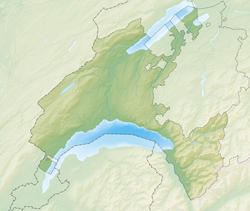Villars-Epeney
| Villars-Epeney | ||
|---|---|---|
 |
||
|
||
| Coordinates: 46°47′N 6°42′E / 46.783°N 6.700°ECoordinates: 46°47′N 6°42′E / 46.783°N 6.700°E | ||
| Country | Switzerland | |
| Canton | Vaud | |
| District | Jura-Nord Vaudois | |
| Government | ||
| • Mayor | Syndic | |
| Area | ||
| • Total | 0.86 km2 (0.33 sq mi) | |
| Elevation | 548 m (1,798 ft) | |
| Population (Dec 2015) | ||
| • Total | 90 | |
| • Density | 100/km2 (270/sq mi) | |
| Postal code | 1404 | |
| SFOS number | 5935 | |
| Surrounded by | Cheseaux-Noréaz, Cuarny, Yvonand | |
| Website |
http://www.villars-epeney.ch Profile (French), SFSO statistics |
|
Villars-Epeney is a municipality in the district of Jura-Nord Vaudois of the canton of Vaud in Switzerland.
Villars-Epeney has an area, as of 2009[update], of 0.9 square kilometers (0.35 sq mi). Of this area, 0.67 km2 (0.26 sq mi) or 77.9% is used for agricultural purposes, while 0.15 km2 (0.058 sq mi) or 17.4% is forested. Of the rest of the land, 0.05 km2 (12 acres) or 5.8% is settled (buildings or roads).
Of the built up area, housing and buildings made up 3.5% and transportation infrastructure made up 2.3%. Out of the forested land, 16.3% of the total land area is heavily forested and 1.2% is covered with orchards or small clusters of trees. Of the agricultural land, 68.6% is used for growing crops and 8.1% is pastures, while 1.2% is used for orchards or vine crops.
The municipality was part of the Yverdon District until it was dissolved on 31 August 2006, and Villars-Epeney became part of the new district of Jura-Nord Vaudois.
The municipalities of Cronay, Cuarny, Pomy, Ursins, Valeyres-sous-Ursins and Villars-Epeney are considering a merger on at a date in the future into the new municipality with an, as of 2011[update], undetermined name.
The blazon of the municipal coat of arms is Or, a thorn bough Vert bendwise.
Villars-Epeney has a population (as of December 2015[update]) of 90. As of 2008[update], 7.1% of the population are resident foreign nationals. Over the last 10 years (1999–2009 ) the population has changed at a rate of 50.9%. It has changed at a rate of 49.1% due to migration and at a rate of 1.9% due to births and deaths.
...
Wikipedia




